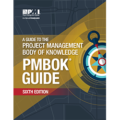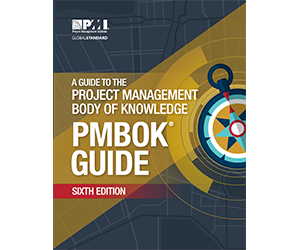
Managing the project resources is how the project manager spends most of their time. From ordering supplies, to training team members, to paying bills, the project resources are a seemingly bottomless pit of active management. Meanwhile, the project team is one of the most important components of project success – Having confidence that your team is going to get the job done right, on time, and under budget, is virtually priceless. This is included in the Project Management Body of Knowledge (PMBOK) Project Resource Management knowledge area.
The 6 processes in this knowledge area are:
- Plan Resource Management
- Estimate Activity Resources
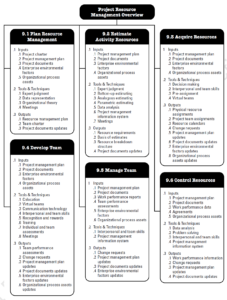 Acquire Resources
Acquire Resources- Develop Team
- Manage Team
- Control Resources
Plan Resource Management
Before any project can proceed, the project resource requirements need to be defined. The main part of this initial planning step involves identifying the type and quantity of resources that are required, including people. Some resources have a grade or skill level associated with them, such as experience level of people, or size of crane. Job descriptions are created for the project team members. The Project Resource Management Plan, a component of the overall Project Management Plan, summarizes this resource planning step.
Inputs
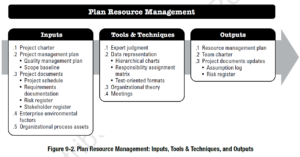 Project charter
Project charter- Project management plan
- Quality management plan
- Scope baseline
- Project documents
- Project schedule
- Requirements documentation
- Risk register
- Stakeholder register
- Enterprise environmental factors
- Organizational process assets
Tools & Techniques
- Expert judgment
- Data representation
- Hierarchical charts
- Responsibility assignment matrix
- Text-oriented formats
- Organizational theory
- Meetings
Outputs
- Resource management plan
- Team charter
- Project documents updates
- Assumption log
- Risk register
Estimate Activity Resources
The resources required to carry out the project must almost always be estimated during the planning stage. Resources are classified into type and quantity, as well as other factors that might affect the cost or schedule, such as grade, quality, availability, and so on. The three primary methods of estimating, Analogous, Parametric, and Three point, are used in conjunction with bottom up or top down estimating to determine the resource requirements.
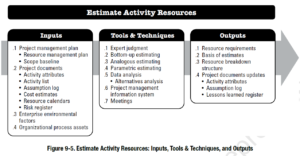 Inputs
Inputs
- Project management plan
- Resource management plan
- Scope baseline
- Project documents
- Activity attributes
- Activity list
- Assumption log
- Cost estimates
- Resource calendars
- Risk register
- Enterprise environmental factors
- Organizational process assets
Tools & Techniques
- Expert judgment
- Bottom-up estimating
- Analogous estimating
- Parametric estimating
- Data analysis
- Alternatives analysis
- Project management information system
- Meetings
Outputs
- Resource requirements
- Basis of estimates
- Resource breakdown structure
- Project documents updates
- Activity attributes
- Assumption log
- Lessons learned register
Acquire Resources
Once the project execution phase is underway, the resources identified in the Resource Management Plan must be acquired. The project schedule is consulted to determine when the resources are needed. The Procurement Management Plan, a separate component of the Project Management Plan, guides the purchasing process for tools and equipment that must be purchased. Project team positions are advertised and the workers are hired.
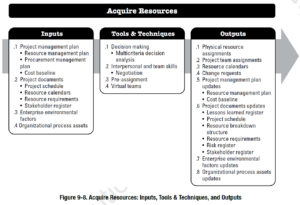 Inputs
Inputs
- Project management plan
- Resource management plan
- Procurement management plan
- Cost baseline
- Project documents
- Project schedule
- Resource calendars
- Resource requirements
- Stakeholder register
- Enterprise environmental factors
- Organizational process assets
Tools & Techniques
- Decision making
- Multi-criteria decision analysis
- Interpersonal and team skills
- Negotiation
- Pre-assignment
- Virtual teams
Outputs
- Physical resource assignments
- Project team assignments
- Resource calendars
- Change requests
- Project management plan updates
- Resource management plan
- Cost baseline
- Project documents updates
- Lessons learned register
- Project schedule
- Resource breakdown structure
- Resource requirements
- Risk register
- Stakeholder register
- Enterprise environmental factors updates
- Organizational process assets updates
Develop Team
Most projects require additional knowledge to complete their deliverables. The project team must obtain this knowledge at the appropriate point in the project timeline. Unlike tools and equipment, project team members require rewarding work, future opportunities, and career development, or they will leave.
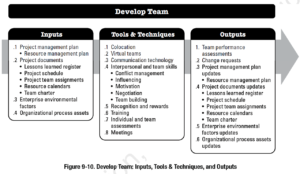 Inputs
Inputs
- Project management plan
- Resource management plan
- Project documents
- Lessons learned register
- Project schedule
- Project team assignments
- Resource calendars
- Team charter
- Enterprise environmental factors
- Organizational process assets
Tools & Techniques
- Colocation
- Virtual teams
- Communication technology
- Interpersonal and team skills
- Conflict management
- Influencing
- Motivation
- Negotiation
- Team building
- Recognition and rewards
- Training
- Individual and team assessments
- Meetings
Outputs
- Team performance assessments
- Change requests
- Project management plan updates
- Resource management plan
- Project documents updates
- Lessons learned register
- Project schedule
- Project team assignments
- Resource calendars
- Team charter
- Enterprise environmental factors updates
- Organizational process assets updates
Manage Team
The project team is one of the most important components of project success (actually, any organization’s success). Project team assignments tend to change as team members learn different project tasks and project managers assess their strengths and weaknesses. Project issues need to be dealt with by the appropriate project team members, and project work needs to be actively managed.
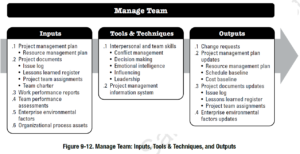 Inputs
Inputs
- Project management plan
- Resource management plan
- Project documents
- Issue log
- Lessons learned register
- Project team assignments
- Team charter
- Work performance reports
- Team performance assessments
- Enterprise environmental factors
- Organizational process assets
Tools & Techniques
- Interpersonal and team skills
- Conflict management
- Decision making
- Emotional intelligence
- Influencing
- Leadership
- Project management information system
Outputs
- Change requests
- Project management plan updates
- Resource management plan
- Schedule baseline
- Cost baseline
- Project documents updates
- Issue log
- Lessons learned register
- Project team assignments
- Enterprise environmental factors updates
Control Resources
The project resources require regular, ongoing control procedures to ensure they are being used most efficiently, that they are performing the required tasks, and so on. The Resource Management Plan must be consulted regularly to ensure that project resource usage is according to plan. Cost-benefit analysis and alternatives analysis are utilized to optimize the use of resources.
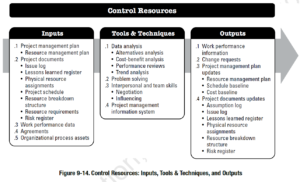 Inputs
Inputs
- Project management plan
- Resource management plan
- Project documents
- Issue log
- Lessons learned register
- Physical resource assignments
- Project schedule
- Resource breakdown structure
- Resource requirements
- Risk register
- Work performance information
- Agreements
- Organizational process assets
Tools & Techniques
- Data analysis
- Alternatives analysis
- Cost-benefit analysis
- Performance reviews
- Trend analysis
- Problem solving
- Interpersonal and team skills
- Negotiation
- Influencing
- Project management information system
Outputs
- Work performance information
- Change requests
- Project management plan updates
- Resource management plan
- Schedule baseline
- Cost baseline
- Project documents updates
- Assumption log
- Issue log
- Lessons learned register
- Physical resource assignments
- Resource breakdown structure
- Risk register
